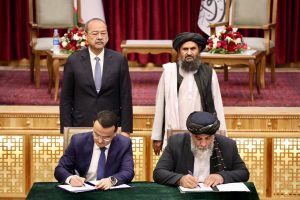On Saturday, August 17 Uzbek Prime Minister Abdulla Aripov became the highest-ranking foreign leader to visit Afghanistan since the Taliban’s 2021 return to power. The $2.5 billion in trade and investment deals signed between the two sides, just days after the third anniversary of the collapse of the Afghan Republic, illustrate Uzbekistan’s growing bilateral relationship with the Taliban government.
The Taliban refers to its government as the Islamic Emirate of Afghanistan. To date no country has formally recognized it as the legitimate government of Afghanistan. Nevertheless, a number of countries – China most prominently, but Uzbekistan and Kazakhstan, too – have engaged with the Taliban diplomatically and commercially. Both China and Kazakhstan have ambassadors in Kabul, and Uzbekistan is expected to send a new ambassador soon, too. Earlier this year, Taliban officials stated their intention to dispatch an ambassador to Uzbekistan.
Aripov’s trip coincided with a visit by Uzbek Minister of Investment, Industry, and Trade Laziz Kudratov, underscoring the economic angle to Uzbekistan’s engagement with the Taliban.
Alongside Deputy Taliban Prime Minister for Economic Affairs Mullah Abdul Ghani Baradar, Aripov oversaw the signing of 35 memorandums of understanding. Baradar’s office, in a statement, said the MoUs included $1.4 billion in 12 investment agreements and 23 trade deals worth $1.1 billion.
Baradar reportedly said, “Today is a very good opportunity to discuss the relations between the two countries and economic issues, especially railways, electricity, trade, transit, and visas.”
One of those agreements is a preferential trade deal which, from October 1, will see the cancelation of duties on a number of Afghan products entering Uzbekistan.
Earlier this year, Uzbek President Shavkat Mirziyoyev signed a decision outlining new rules and regulations for the Termez International Trade Center area, a free-trade zone in city of Termez on the Afghan-Uzbek border, including the allowing of payments in U.S. dollars, Russian rubles, euros, Chinese yuan, as well as Uzbek som. The decision also paved the way for Afghan and Pakistani citizens to lease and own shops and buildings in the area. In addition, the decision allowed foreign citizens to enter the area without a visa for 15 days.
In outlining the outcomes of his trip to Afghanistan, Kudratov mentioned hopes to increase mutual trade to $3 billion. In the January-June 2024 period, trade turnover between Afghanistan and Uzbekistan was $461 million.
Kudratov said that the customs station at the Ayritom-Hairatan border post – the site of Afghanistan-Uzbekistan Friendship Bridge – just outside of Termez now operates 24 hours a day, allowing traffic to flow. Kudratov noted also that Afghan entrepreneurs would be exempt from all taxes. Finally, he said that work was being carried out in regard to the construction of a trans-Afghan railway line, promising that “practical work” would begin soon but offering few concrete details.
Although Uzbekistan has one of the shorter borders with Afghanistan – just 144-kilometers (89.4 miles) – it is one of the most amendable to deepening trade. The Taliban’s relationship with Pakistan has been tumultuous over the years, troubled by Islamabad’s accusations that the government in Kabul is harboring its enemies, namely the Tehreek-e Taliban Pakistan (TTP). Pakistan’s own domestic instability complicates the investment potential, too. The Iranian border, meanwhile, given international sanctions on Iran, hardly presents an easy access point to international markets. Uzbekistan, therefore, threads the needle with a stable government, a reasonably well developed economy, and amicable international relations.
Unmentioned in the various statements and news reports regarding the visit was any discussion of an “inclusive” government in Afghanistan, let alone an elected one. Uzbekistan – like China, Russia, and number of other countries that have engaged with the Taliban – has paid little attention to the plight of women, girls, and minorities in Afghanistan.

































